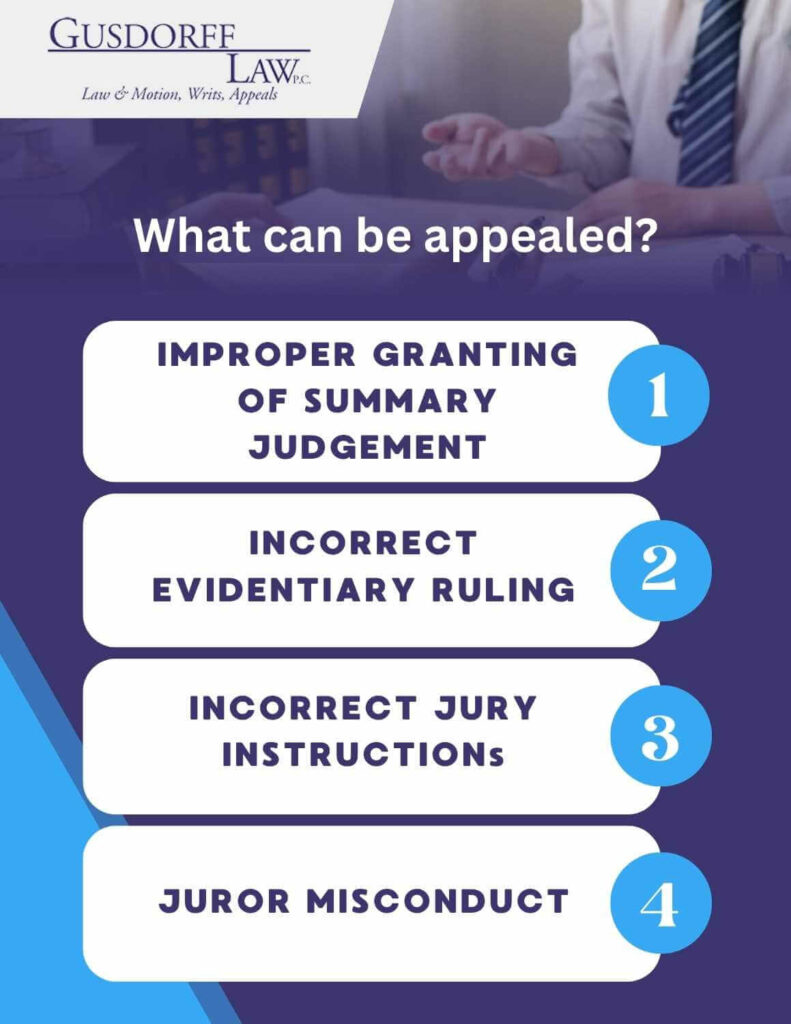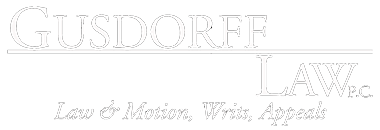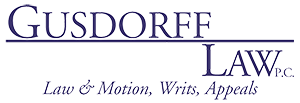If your case ended prematurely, or you were deprived of a verdict because of prejudicial errors at trial, an appeal could provide relief. And, if you achieved a favorable outcome for your client, congratulations! Many opponents fight to the bitter end and challenge the judgment on appeal. Either way, you will need Los Angeles-based appellate litigation counsel, specifically a certified appellate specialist.
Appeals depend on written briefs that are submitted to the appellate court as well as an oral argument in most cases. To prevail on appeal, you therefore need counsel that’s well-versed in appellate procedure, legal research, legal writing, and can bring a fresh perspective with an eye toward what is most persuasive to an appellate judge or justice. Fortunately, attorney Gusdorff fits the bill.
Janet Gusdorff is a certified appellate law specialist (California Board of Legal Specialization) and founder of Gusdorff Law, who not only provides a unique approach and perspective to appellate law but also has handled writs and appeals exclusively since 2006.
If you would like to learn more about appeals in Los Angeles and California at large or would like to file one, contact us today at Gusdorff Law by calling 818-877-4515 to schedule a consultation with a leading appellate attorney.
What Is Appellate Law?
Generally speaking, appellate law is an area of law that focuses on convincing a higher court to overturn a lower court’s decisions through appeals and writs. It is the process through which you can challenge the ruling or judgment made in a trial court before a panel of judges who review the case based primarily on legal arguments raised by written briefs filed by the challenging party — the appellant, and the party defending the judgment or order — the respondent/appellee. Lawyers who handle such cases are referred to as appellate lawyers.
Appellate law happens both at the state and federal level as well as in criminal and civil law. The vast majority of systems, including California and the Ninth Circuit, have mid-level appeals courts as well as a high-level supreme court where decisions can be appealed to in a case.
Appellate courts can review procedural and substantive legal errors that either party believes affected the outcome of the case.
Although an appeal is not a re-trial, it involves a substantial amount of legal work. Some of the work appellate lawyers perform include reviewing the entire record of the case in the lower court (including transcripts, motions, testimony, exhibits, etc.), conducting comprehensive legal research, preparing appellate briefs, and in many circumstances, participating in an oral hearing before a panel of appellate judges or justices.
How Does an Appellate Lawyer Differ From a Trial Lawyer?
Trial lawyers focus on resolving factual disputes within the context of applicable law. They handle a variety of matters including pleadings and discovery to uncover the facts that will help them communicate their clients’ stories to the factfinder, whether trial court or jury. Appellate lawyers have a different audience and a different role from trial lawyers, and therefore require a skillset that’s remarkably different from that of a trial lawyer. Here are 3 ways an appellate lawyer differs from a trial lawyer:
Skillset
A successful trial lawyer excels at gathering evidence and presenting it in a coherent way before a trial court while reacting swiftly to unexpected courtroom developments. Effective appellate lawyers, in contrast, are skilled in persuasive legal research and writing along with the oral presentation of complex legal concepts.
Fresh Perspective
A trial lawyer could have handled a case for years, developing it sequentially from start to finish i.e. pleadings, discovery, motions, and finally trial. Appellate lawyers, on the other hand, look over the entire record in the reverse direction. Like the appellate court, appellate lawyers start with the ruling and look backwards, trying to identify where errors were made so that the ruling may be reversed or upheld (depending on their clients’ goals).
Excellent Research and Writing Skills
While trial attorneys obviously research and write well, they usually don’t have the time to devote to these skills daily. The pace of appellate litigation, however, gives appellate lawyers a time advantage to hone and refine excellent legal research and writing skills. Effective research skills are incredibly important since finding the right precedent and effectively using it could mean the difference between winning and losing the appeal.
What Can Be Appealed?
Not every case can be appealed, and not every legal or factual error can be appealed. Numerous mistakes occur in every litigation, but there are procedural and substantive laws that limit the viability of issues that may be raised. On appeal, the judgment is presumed to be correct and the party appealing must demonstrate that there was legal error that affected the judgment. Some of the most common civil appellate issues include:
Improper Granting of Summary Judgement
Most cases are resolved before they reach trial. Unfortunately, many of those cases are terminated prematurely at the summary judgment stage due to improper application of relevant law to the factual dispute. A successful appeal of a summary judgment entitles the plaintiff to continue pursuing the lawsuit in the trial court.
Incorrect Evidentiary Ruling
The California Evidence Code determines whether or not evidence is admissible in court. The evidence presented at trial should at least be relevant, not to create undue prejudice, not be hearsay, and have a reliable foundation in fact.
It is possible to argue on appeal that certain evidence was admitted when it ought to have been excluded, or that certain evidence was considered inadmissible when it should have been introduced to the trial court. The appellate court reviews evidentiary rulings with deference to the trial judge’s discretion, so whether to challenge evidentiary rulings in an appeal largely turns on the impact that such rulings had on the proceedings.
Incorrect Jury Instructions
The judge usually provides the jury with instructions regarding the applicable law for the case and how that law should be applied to the evidence that was introduced at trial. Common appellate issues include the judge’s failure to properly instruct the jury because of instructions that were given or that were not given but should have been.
Juror Misconduct
During the entirety of the trial, jurors are subject to strict rules. You may find out that one or more jurors violated those rules, which ultimately affected the outcome of your case. A good example of this is speaking with other jurors, lawyers, witnesses, or the judge outside the courtroom. Juror misconduct is yet another issue that can be raised at appeal, assuming necessary procedural prerequisites have been satisfied.
What Functions of the Appellate Process Does Gusdorff Law Handle?
At Gusdorf Law, we handle many aspects of the Los Angeles appellate litigation process, which include but are not limited to:
Notice of Appeal
It is the initial document that informs the court of your intention to file an appeal. Depending on the nature of the case and facts surrounding the need to appeal, the date may vary. The notice of appeal is the initial step in the process of getting a ruling or judgment overturned.
Due to this reason, you should work closely with your appeals lawyer to make sure that the document is filed in time. Failure to file the document on time means that you will be barred from filing an appeal.
Opening Brief
It is the first opportunity your lawyer will have to explain to the higher court why you are entitled to an appeal. It is usually lengthy in nature since it includes a thorough review of relevant facts and procedural history of your case, the judgment or orders that are being challenged, and cases, statutes and rules demonstrating reversible prejudicial errors in the lower court.
Respondent/Appellee Brief
When your client prevailed in the lower court and opposing counsel has appealed the judgment or ruling, you have one opportunity to comprehensively address the legal issues raised in the opening brief. This brief must persuade the court that there were no reversible prejudicial errors and that the rulings of the lower court should remain untouched.
Reply Brief
The reply brief allows the appellant to respond to the arguments made in the respondent’s or appellee’s brief. Keep in mind, however, that no new legal arguments may be raised for the first time in a reply brief, so it is important that you speak with your appellate specialist to ensure that your opening brief was complete.
Writ Petition
A writ is a formal order that’s typically issued by a higher court (e.g., Court of Appeal) ordering an administrative body or a lower court (e.g. Trial Court) to either do something or cease doing something.
A petition for a writ has similarities to an appeal, but the focus for writ relief is different. The goal of a writ petition is to convince the appellate court to intervene because a party will suffer irreparable harm if it does not. Writ relief is extraordinarily rare, but is a powerful tool that can result in the higher court ordering the lower court to take certain action or to refrain from taking certain action that may alter the course of a lawsuit.
Some of the most common types of civil writ petitions include:
- Petition for Writ of Supersedeas: Requests the appellate court order a stay of the proceedings during the pendency of the appeal or other writ proceedings in order to keep the “status quo” and prevent irreparable harm in the interim.
- Petition for Writ of Prohibition: Requests the appellate court order the lower court to refrain from taking specific action.
- Petition for Writ of Mandate: Requests the appellate court order the lower court to take a particular action.
Oral Arguments
Appeals may not always take place entirely on paper. Your attorney may also be allowed to orally defend you in court and present your position to the higher court.
The hearings are typically short, which is why you should avoid reiterating the facts stated in the briefs. Instead, your attorney should spend time explaining the brief’s most important parts and answering any questions that may arise.
Petition for Rehearing
After your case is submitted (following briefing or when allowed, following oral arguments), the appellate court will take additional time to review the matter and then issue its ruling.
If you are not satisfied with the higher court’s decision and you believe the court may have overlooked an important legal issue, for instance, you can request a rehearing. You need to do this shortly after the appeal court’s ruling has been made, so speak with your appellate lawyer immediately if this is an option you are considering.
Petition for Review
Once the appellate court’s decision is final, you may request the California Supreme Court or the full Ninth Circuit (en banc) or United States Supreme Court to review the decision. The procedures for these requests differ, and in some cases, time limits may prevent relief.
What Types of Appeals Does Gusdorff Law Handle?
At Gusdorff Law, we handle various kinds of appeals, which include:
- Anti-SLAPP appeals
- Arbitrability Disputes
- Contract Law
- Defamation
- Employment Law
- Personal Injury
- Product Liability
- Premises Liability
- Probate
- Real Estate
Need Help With Los Angeles Appellate Litigation?
The conclusion of the trial court proceedings doesn’t always imply that the case has ended. If you prevailed, your opponent may appeal and you need an appellate expert to protect your judgment. If you or your client lost your case because of faulty rulings in the process, or if you prevailed only to receive an insufficient award, you may count on us to help you maximize your chance to obtain a better outcome.
Handling appeals requires special skills, including the ability to critically analyze your case and applicable law, synthesize complicated matters into persuasive writing, and understand how your case fits within the overall jurisprudence. Our extensive experience in the appellate courts in Los Angeles and California at large provides us with the knowledge and experience needed to navigate the appellate process.
If you need help with your appeal, call the trusted Los Angeles appellate litigation lawyers at 818-877-4515 to schedule your consultation.






